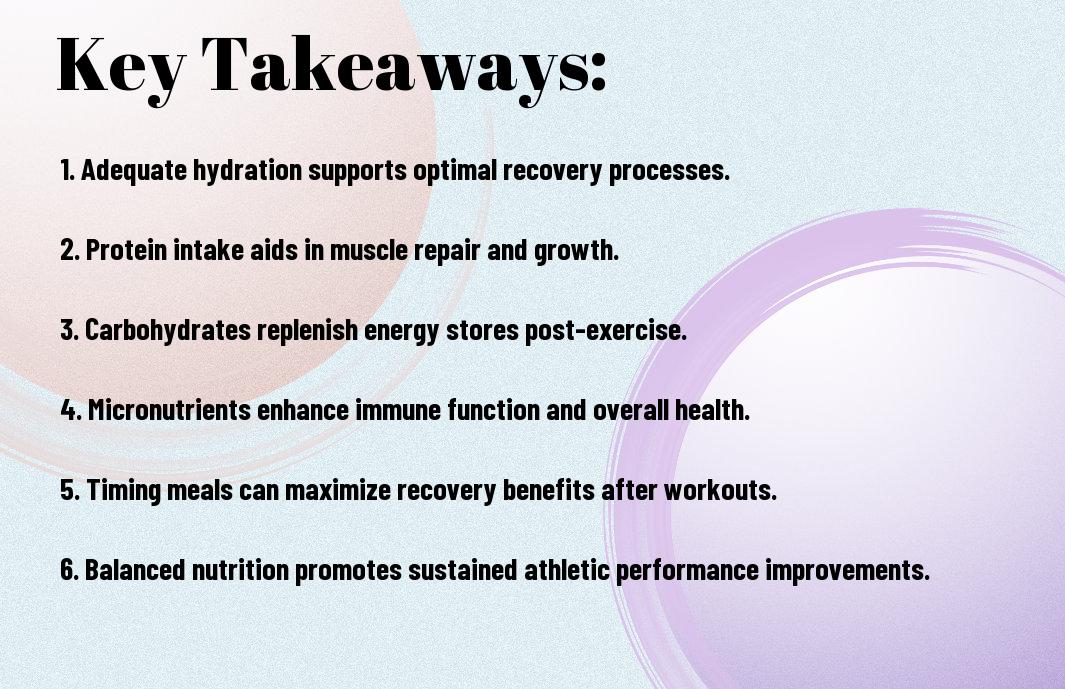Recovery is a vital phase in your athletic journey, and nutrition plays a significant role in how effectively your body bounces back after intense physical activity. By focusing on the right nutrients, you can minimize muscle soreness, replenish energy stores, and support overall healing. Understanding the importance of proper hydration, carbohydrates, proteins, and fats can empower you to optimize your recovery process. This post will guide you through the necessary nutritional strategies necessary for enhancing recovery and ensuring you’re ready for your next challenge.

Key Takeaways:
- Hydration: Maintaining proper fluid levels is crucial for optimal recovery, as dehydration can impair muscle repair and overall performance.
- Protein Intake: Consuming adequate protein helps to rebuild damaged muscle tissues and supports muscle synthesis post-exercise.
- Carbohydrates: Replenishing glycogen stores with carbohydrates post-activity fuels recovery and prepares the body for future exercise.
- Vitamins and Minerals: A balanced diet rich in micronutrients supports cellular repair, immune function, and reduces inflammation.
- Timing: The timing of nutrient intake, especially within the ‘recovery window’ after exercise, can enhance the effectiveness of nutrition in muscle recovery.

Understanding Sports Recovery
Before you can optimize your performance, it’s vital to grasp the significance of sports recovery. Recovery is the process your body undergoes to restore itself following physical exertion, including muscle repair, glycogen replenishment, and overall energy restoration. Understanding the various components of recovery enables you to implement effective strategies to enhance your athletic performance and longevity in your chosen sport.
Phases of Recovery
One way to comprehend recovery is by recognizing its phases: immediate, short-term, and long-term. Each phase serves a unique purpose, from addressing acute soreness and inflammation soon after exercise, to gradually restoring strength and endurance over weeks. By identifying these phases, you can tailor your recovery approach to suit your individual needs.
Importance of Recovery for Athletes
To maximize your training benefits, adequate recovery is vital. It not only helps mitigate fatigue and soreness but also plays a significant role in reducing injury risk and improving your overall performance. Focusing on recovery ensures that you can consistently train at your best.
At the heart of athletic success lies the understanding that recovery is as important as the training itself. When you prioritize recovery, you allow your muscles to heal and adapt to the stresses you’ve placed on them, leading to increased strength and endurance. Additionally, effective recovery strategies can improve your mental resilience and focus, ensuring you stay sharp and motivated throughout your training and competitions. Recognizing the value of recovery enables you to make informed decisions that support your long-term athletic goals.
Key Nutrients for Recovery
Some important nutrients play a vital role in your recovery post-sport. It’s important to ensure you’re consuming the right balance of macronutrients to aid in muscle repair, replenish energy, and support overall recovery. For more insights, refer to The role of nutrition in performance recovery | Sanford Sports.
Carbohydrates
Between workouts, your body requires adequate carbohydrate intake to replenish glycogen stores. This energy source is important for optimal performance in future training sessions and competitive events.
Proteins
One of the primary nutrients for recovery is protein, which you need to repair muscle tissue damaged during exercise. Your body uses amino acids derived from proteins to rebuild and strengthen muscles.
With proper protein consumption, you support the growth of lean muscle tissue, reduce soreness, and enhance overall recovery. Aim to include high-quality protein sources such as lean meats, fish, dairy, legumes, and plant-based protein supplements in your post-exercise meals to promote efficient recovery.
Fats
Beside proteins and carbohydrates, healthy fats are integral for recovery as they provide important fatty acids and aid in hormone regulation. Including sources of healthy fats can also assist in reducing inflammation.
The inclusion of healthy fats like avocados, nuts, seeds, and olive oil not only supports your overall energy levels but also allows for better nutrient absorption and cellular repair after strenuous physical activity.
Hydration and Recovery
After intense physical activity, replenishing your body’s fluid balance is crucial for optimal recovery. Adequate hydration helps transport nutrients throughout your body, improves metabolic processes, and reduces the risk of cramps and fatigue. By prioritizing fluid intake, you can enhance your overall recovery and performance for future activities.
Importance of Fluid Balance
Between workouts and games, maintaining proper fluid balance is key to avoiding dehydration, which can impair your performance and recovery. Dehydration can lead to decreased strength, endurance, and cognitive function. By monitoring your fluid intake, you ensure that your body can effectively recover and be ready for your next challenge.
Electrolytes and Their Role
After physical exertion, it’s not just water you need; electrolytes play a vital role in recovery. These minerals, such as sodium, potassium, and magnesium, regulate body functions and help maintain fluid balance. They are lost through sweat and must be replenished post-exercise to support muscle contraction, nerve function, and overall hydration.
In addition to maintaining fluid balance, electrolytes assist in preventing muscle cramps and minimizing fatigue during your recovery. Consuming sports drinks or electrolyte-rich foods can help restore these crucial minerals in your body, ensuring that you are not only hydrated but also primed for optimal performance. Making electrolyte replenishment a part of your recovery plan can significantly improve your results and readiness for subsequent athletic endeavors.
Nutritional Strategies for Optimal Recovery
Your recovery after sports performance hinges significantly on nutrition. In order to enhance your recovery, it’s important to explore Nutrition for Muscle Repair and Recovery. Implementing well-timed nutrient intake and choosing the right recovery meals can make all the difference in how efficiently your body heals and rebuilds after the physical exertion of sports.
Timing of Nutrient Intake
Any athlete knows that nutrient timing is key to effective recovery. Consuming the right ratios of carbohydrates and proteins shortly after exercise may improve muscle protein synthesis and promote quicker recovery. Aim to coordinate your intake shortly after your workout to ensure your body gets the nutrients it needs when it is most receptive.
Recovery Meals and Snacks
Among the options available, focusing on recovery meals and snacks that combine protein and carbohydrates can speed up the recovery process. Ideally, you should strive for a meal or snack containing high-quality protein, such as lean meat, legumes, or dairy, along with complex carbohydrates like whole grains or fruits.
Strategies for effective recovery meals include preparing nutrient-dense snacks like Greek yogurt with fruit, a protein smoothie with spinach and banana, or a chicken wrap with whole-grain bread. These combinations will provide your body with the necessary building blocks for muscle repair while replenishing glycogen stores to get you ready for your next training session. Tailoring your meals and snacks to fit your activity level will enhance your recovery experience.
Supplements and Recovery
Once again, nutrition plays a significant role in your recovery process, and supplements can offer additional support. They help fill in nutritional gaps when whole foods may fall short, particularly during intense training periods or following injury. By incorporating targeted supplements, you can enhance performance, reduce recovery time, and optimize your body’s ability to heal and rebuild.
Common Supplements for Athletes
Supplements commonly used by athletes include protein powders for muscle repair, omega-3 fatty acids to reduce inflammation, and branched-chain amino acids (BCAAs) to decrease muscle soreness. Each of these can contribute to quicker recovery and improved performance by addressing specific needs during and after rigorous physical activity.
Evaluating Supplement Efficacy
Any supplement you consider should be evaluated for its efficacy based on scientific research and individual needs. It’s important to assess the credibility of studies supporting the supplement claims and how it aligns with your specific recovery goals and overall diet.
Supplements can vary significantly in quality and effectiveness, making it important for you to do thorough research before integrating them into your regimen. Look for third-party testing, read reviews, and consult with a healthcare professional or nutritionist to help determine what may be the best fit for you. This way, you ensure that your approach to recovery is informed and tailored to your unique requirements.
Individualized Nutrition Plans
All athletes have unique needs when it comes to recovery nutrition. By developing individualized nutrition plans, you can ensure that your specific requirements are met, enhancing your recovery process. These plans take into account your sport, training intensity, and personal health factors, allowing you to optimize your performance and recovery.
Tailoring Nutrition to Sport
With each sport demanding different energy expenditures and nutrient needs, tailoring your nutrition accordingly is vital. For example, endurance athletes may require more carbohydrates for energy, while strength athletes need a higher protein intake to support muscle repair. A customized approach will help you meet these specific demands to improve your recovery outcomes.
Monitoring and Adjustments
Against the backdrop of personalized nutrition, ongoing monitoring and adjustments are necessary for optimal recovery. As your training intensity and goals evolve, so should your nutrition plan. Regular assessments ensure that you’re meeting your body’s changing demands, helping you stay on track with your recovery.
Nutrition plays a pivotal role in monitoring your recovery progress. By keeping track of your energy levels, performance, and how you feel after training, you can identify what works and what doesn’t. Adjustments may include altering macronutrient ratios, increasing hydration, or fine-tuning meal timing. The goal is to create a dynamic plan that supports your recovery journey, enabling you to train effectively while minimizing the risk of injury and fatigue.
FAQ
Q: How does nutrition impact muscle recovery after intense physical activity?
A: Nutrition plays a vital role in muscle recovery by providing the necessary nutrients that aid in repairing damaged muscle fibers. Consuming protein after exercise helps stimulate muscle protein synthesis, leading to recovery and growth. Additionally, carbohydrates are important for replenishing glycogen stores that are depleted during physical activity. Incorporating a balanced meal that includes both protein and carbohydrates within a few hours post-exercise can significantly enhance recovery.
Q: What specific nutrients should athletes focus on for optimal recovery?
A: Athletes should prioritize several key nutrients for effective recovery. Protein is important for muscle repair, while carbohydrates are necessary to restore energy levels. Incorporating healthy fats can also provide long-lasting energy and assist in inflammation reduction. Additionally, vitamins and minerals, especially those with antioxidant properties like vitamins C and E, can help mitigate oxidative stress caused by strenuous exercise. Staying hydrated is equally important, as fluids are necessary for various bodily functions and recovery processes.
Q: How can hydration influence recovery after sports activity?
A: Hydration plays a significant role in recovery by facilitating various physiological processes. Adequate fluid intake helps maintain blood volume, which is important for nutrient transport and waste removal. Dehydration can lead to prolonged recovery times, increased muscle soreness, and a higher risk of injury. Athletes should pay attention to their fluid intake before, during, and after exercise, ensuring they replace any fluids lost through sweat. Consuming electrolyte-rich fluids can also help restore balance in the body and support overall recovery.

